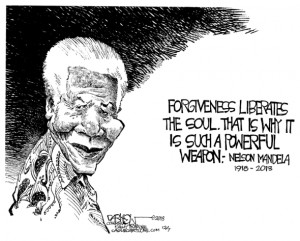Years ago I found myself in a Bible study group. I didn’t want to be there and I could have just said no, but that’s for another post. Suffice it to say that as much as I disliked the experience, my participation there was yet another impetus for me to listen to God’s  call to me.
call to me.
The ladies who participated were sincere and very nice. And all of them knew way more than I did about the Scriptures. I found that intimidating at first, but I also learned that all of us can see something different in a particular scripture passage depending on the context, what we’re experiencing in our personal and professional lives, and how the Holy Spirit is opening the passage to us. There are certainly correct and incorrect interpretations of scripture. But there are more passages, I think, that must be continually interpreted and whose interpretations will change as we mature in our reading of the texts and as we mature in how we view God’s work in the world.
So we were going blissfully along, meeting weekly, studying individual books of the Bible, and using a companion resource to assist us in our interpretation. It was unavoidable, then, that we would eventually come to the issue of forgiveness.
In both Testaments, forgiveness is a major issue of discussion. For instance, in Jeremiah 31:34, we read “No longer shall they teach one another, or say to each other, “Know the LORD,” for they shall all know me, from the least of them to the greatest, says the LORD; for I will forgive their iniquity, and remember their sin no more.” It seems that when God issues forgiveness, God also wipes the slate clean and seems to completely forget that whatever we did to tick God off or hurt God is completely gone from God’s memory. At least that’s the example that God is setting for us. I don’t think for a minute that God had a short memory. But I do believe that what this passage means is that God won’t hold whatever we did against us – once God has forgiven us.
There’s a passage in the Second or New Testament where Jesus states, “If you forgive the sins of any, they are forgiven them; if you retain the sins of any, they are retained.” – John 20:22
And here’s the rub, this seems to be a forgive and forget situation too. It would seem that Jesus is saying if we forgive, then we must forget.
That’s where the ladies’ Bible study fell in into a bit of mayhem. We talked candidly about our own ability to forgive and our unwillingness to do it. There may have been a person who said she had a circumstance that she had been unable to forgive. And I remember saying that I could forgive, but there were certain circumstances that I could not forget.
The lady diagonally across the table from me looked me squarely in the eye and said, “Then you haven’t forgiven. If you forgive, you must also forget.”
This Bible study episode came back to my mind during Sunday School a few days ago. The teacher point blank asked the question, “But can we say we have truly forgiven if we cannot forget?”
And I, with little hesitation, responded with a point blank, “Yes.”
You see, I was dumbstruck by the woman at the Bible study table who was so absolute in her determination that we must forget the hurts perpetrated upon us or we have not reached deeply enough inside our souls to forgive. So over the years I’ve had to think about this a lot. We’re not God, after all. While hanging on to grudges is certainly wrong (for Pete’s sake, it’s water under the bridge; let it go!), I’m not sure it’s even wise to forget some of the things for which we have provided forgiveness.
I have seen so many physically and emotionally abused people continually return to their spouses, to their siblings, to their partners because they have been encouraged to forgive and forget. And when they forget, that’s when they head right back into those abusive situations. Forgetting impairs their ability to walk away. Telling them to forgive and forget leaves them feeling that the abuse is somehow their fault because they fall short in the forgetting part of the command.
Any of us may have been exposed to a war-time situation where we have lost someone we love. Yes, it is necessary to forgive those who kill, but by remembering that loss and how it happened, we are informed to make better decisions later about war and our participation in it.
I know a woman who was severely beaten and permanently disabled in the midst of an armed robbery. She has forgiven. Her disabilities, however, have not only kept her from forgetting what those young men did to her, but in the midst of forgiveness and her remembrance, she has physically met with the men as part of a restorative justice program where they are given the opportunity to express their sorrow after they hear her forgiveness. Sometimes it happens; sometimes it doesn’t. But by hearing her forgiveness and remembering what they did to her, she has been allowed to move on with her life and the door has also been opened for them to come to terms with their own.
We all know our own issues with forgiveness. Some just plain don’t struggle with it at all. They hold on to that pain, that grudge for years and years. The irony, of course, in not forgiving is that we are only hurting ourselves, not the person who hurt us in the first place.
But for those of us who do struggle with it – and I’m very willing to say while I seldom hold a grudge, I have had some times in my life where I have tussled mightily with forgiveness – once we do offer the forgiveness then I believe we must make yet another decision about whether we will forget the malice, spitefulness, and heartlessness committed against us.
Forgiving and forgetting are two completely separate issues.
Jesus said, “If you forgive the sins of any, they are forgiven them; if you retain the sins of any, they are retained.” It’s easy enough to understand that first phrase. If we forgive someone, they are forgiven. The second part of that phrase, however, is misinterpreted to mean “…if you remember the sins of any, they are remembered and, therefore, you have not forgiven.”
Jesus isn’t talking about remembering the sins at all. He is simply reinforcing the need to forgive: “If you do not forgive the sins of someone, they are not forgiven.”
All of us hurt one another all the time. I venture to say that most of those are unintentional. We may not even be aware that we have hurt someone. For that reason alone, we should be willing to step up and forgive those who hurt us. We are all errant in our relationships with one another. And we must forgive so that we can move on with our own lives.
But to forget those situations where our injuries are so profound is sheer folly. Yes, we must forgive even those, but we should not forget them. Remembering how we were hurt helps us to avoid that kind of unfathomable hurt again, and it gives us an empathy for those who are also hurt and who do the hurting. God does not ask us to be gluttons for punishment.
Forgiving is one thing. Forgetting is something else entirely that requires an intense contemplation of whether it is for everyone’s best interests or not – and how it honors God.
Share here:
11 comments for “Forgiving and forgetting”